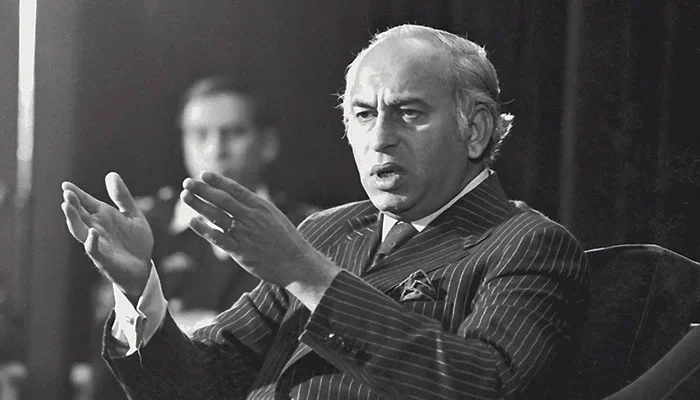Introduction
Zulfikar Ali Bhutto was one of the most influential political figures in Pakistan‚Äôs history. His bold leadership and transformative policies reshaped the country‚Äôs political and economic landscape. From his leadership of the Pakistan People’s Party (PPP) to his vision for Pakistan‚Äôs nuclear program, Bhutto‚Äôs legacy remains a cornerstone of Pakistan‚Äôs development. In this article, we explore Bhutto‚Äôs life, political rise, policies, and lasting impact.
Early Life and Education of Zulfikar Ali Bhutto
Zulfikar Ali Bhutto was born on January 5, 1928, in Larkana, Sindh, into a prominent political family. His father, Sir Shah Nawaz Bhutto, was a well-known figure in the region‚Äôs politics. Bhutto’s early education began at Aitchison College in Lahore, followed by studies at the University of Southern California and later the University of Oxford. These academic experiences shaped Bhutto’s political ideas and helped him develop the skills that would later define his leadership style.
Zulfikar Ali Bhutto’s Rise to Power
Bhutto’s political career took off in the 1950s, initially through his involvement with the All-India Muslim League. His intellect and charismatic speeches made him a well-known figure in Pakistan. By the 1960s, Bhutto became Pakistan’s Foreign Minister under President Ayub Khan. During his time in office, he played a significant role in advancing Pakistan‚Äôs foreign policy and securing international support, especially in the realm of nuclear defense.
In addition, Bhutto’s advocacy for Pakistan’s nuclear program began to take shape, further establishing his global influence.
Founding the Pakistan People’s Party (PPP)
In 1967, Zulfikar Ali Bhutto founded the Pakistan People‚Äôs Party (PPP), which quickly became a political force in the country. His platform, aimed at addressing social and economic issues, resonated with the common people. Bhutto‚Äôs slogan, “Roti, Kapra, Aur Makan” (Food, Clothing, and Shelter), highlighted his commitment to improving the lives of Pakistan‚Äôs working class. His leadership marked a shift in Pakistan‚Äôs political environment, where previously dominant elites were challenged by a populist movement.
Zulfikar Ali Bhutto’s Time as Prime Minister
In 1970, Bhutto led the PPP to victory in national elections, becoming the Prime Minister of Pakistan. His administration focused on nationalizing major industries and redistributing wealth to reduce poverty. Although these policies had a significant impact, they also faced strong opposition from business elites and the military.
Despite the controversy, Bhutto‚Äôs leadership was pivotal in shaping the country’s political and economic framework during the 1970s.
Zulfikar Ali Bhutto’s Foreign Policy and Nuclear Ambitions
Bhutto‚Äôs foreign policy was both strategic and bold. He sought to position Pakistan as a key player in global politics by fostering strong ties with China and Middle Eastern nations. However, his most ambitious foreign policy initiative was the development of Pakistan‚Äôs nuclear program. Bhutto‚Äôs famous declaration, ‚ÄúWe will eat grass, we will go hungry, but we will get one of our own nuclear bombs,‚ÄĚ underscored his unwavering commitment to ensuring Pakistan’s security.
Under Bhutto’s leadership, Pakistan made significant strides in advancing its nuclear capabilities, which became a cornerstone of its defense strategy.
The Downfall of Zulfikar Ali Bhutto
In 1977, Bhutto’s government faced a military coup led by General Zia-ul-Haq. Bhutto was arrested and accused of conspiring in the murder of political opponent Nawab Mohammad Ahmad Khan Kasuri. Despite global protests and appeals for clemency, Bhutto was sentenced to death and executed on April 4, 1979. His execution remains one of the most controversial moments in Pakistan’s history.
Zulfikar Ali Bhutto’s Enduring Legacy
Zulfikar Ali Bhutto’s legacy endures in Pakistan today, particularly through the PPP, which continues to be a major political party. His leadership, both in shaping Pakistan’s nuclear capabilities and advocating for social justice, has had a lasting impact. Despite the criticism of his leadership style and his tragic end, Bhutto’s vision for a stronger, independent Pakistan remains influential.
Bhutto’s focus on progressive policies and national security has shaped Pakistan‚Äôs trajectory, and his contributions to the country‚Äôs development continue to be discussed and analyzed.
Conclusion
Zulfikar Ali Bhutto was a visionary leader who fundamentally reshaped Pakistan’s political and economic landscape. His bold policies, particularly in foreign affairs and defense, helped secure Pakistan‚Äôs place in the global arena. While his political career ended tragically, Bhutto’s influence on Pakistan’s future remains undeniable.
Image Source: Geo TV.
